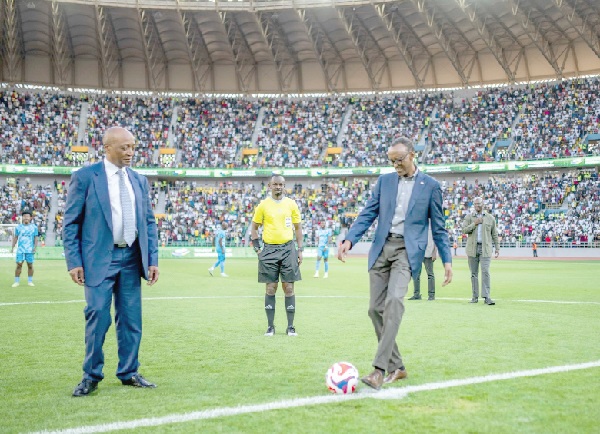
Rwanda’s game plan: Lessons for Ghana on leveraging sports for economic growth
This week, Paris will be transformed into the epicentre of global sports as the world's elite athletes from 206 countries, including Ghana's proud eight-member contingent, converge on the French capital.
The 2024 Olympic Games promise more than record-breaking feats and medal hauls—they're a celebration of sporting excellence, culture, tourism and business.
Why do countries compete fiercely and spend billions to host international sporting events? The reasons are manifold. Hosting these events has evolved into a powerful development enabler and a strategic political tool for rebranding nations.
Qatar, Saudi Arabia, and Rwanda, despite their relatively modest sporting legacies, are pouring fortunes into hosting major competitions, ensuring their presence on the global stage. Sports have long been a potent force for development and political influence.
Ghana's first President, Dr Kwame Nkrumah, brilliantly leveraged sports for soft power and to promote his Pan-African vision.
He played a pivotal role in establishing the Confederation of African Football and the African Games and proudly hosted the Africa Cup of Nations in 1963.
Decades later, South Africa hosted the 2010 FIFA World Cup, reaping sporting, economic and socio-political rewards.
Rwanda, under the strategic leadership of President Paul Kagame, is now using sports to forge a strong identity as an emerging African power.
Ghana's mixed results
In the past two decades, Ghana has made significant investments in sports infrastructure and hosted notable competitions, such as the 2008 Africa Cup of Nations and the recent African Games.
However, the country has struggled to leverage these events for lasting benefits.
The mismanagement of stadiums used for the 2008 AFCON has left many questioning if the $240 million investment in the 13th African Games will yield long-term gains beyond sports.
Rwanda, on the other hand, is setting a precedent in how to strategically harness sports for development.
The East African country's forward-thinking approach integrates sports into its overall development strategy. Investment in sports drives tourism and informs various initiatives.
Tourism, a significant portion of Rwanda's GDP, is bolstered by sports, which has become a cornerstone of the country's development agenda.
The global sports industry is a $500 billion powerhouse, and Rwanda is smartly tapping into this lucrative market through its ‘Visit Rwanda’ brand. Partnerships with football giants such as Arsenal FC, Paris Saint-Germain and Bayern Munich are showcasing Rwanda’s beauty and boosting its tourism appeal to billions of fans globally.
These collaborations are already paying off, positioning Rwanda as a hotspot for international competitions in football, basketball, triathlon, beach volleyball and cycling. Rwanda’s football strategy is particularly noteworthy.
The country has embarked on a mission to elevate its football profile by attracting top talents from Ghana and other African nations.
In recent months, Rwandan clubs have secured some of the best players from Ghana’s Premier League, along with top talents from other African countries.
This move is part of a broader strategy to enhance the local league’s competitiveness and appeal, positioning the Rwandan football league as a magnet for top talents and a significant attraction in the coming years.
Pioneering partnerships
The ‘Visit Rwanda’ strategy, in collaboration with the NBA, FIFA, Arsenal, PSG, and Bayern Munich, aims to enhance tourism, sports and entertainment.
Backed by President Kagame and the Rwanda Development Board (RDB), these global partnerships have been pivotal in Rwanda’s post-Covid tourism recovery, attracting over 1 million visitors in 2022 and generating more than $240 million in revenue.
President Kagame’s visionary approach is evident in the inauguration this month of the state-of-the-art Amahoro Stadium, a 45,000-capacity venue poised to host major football events.
Rwanda is quickly becoming a benchmark for sports infrastructure in Africa, with the Kigali BK Arena, constructed in just six months, hosting global concerts and major events like the FIFA World Congress and the Basketball Africa League (BAL).
This arena, alongside the BAL, is a testament to Rwanda’s strategic use of sports to enhance its international profile.
The BAL, a joint venture with the NBA, is pivotal in Rwanda’s strategy to connect with the African market.
NBA Africa’s significant investments in building the basketball ecosystem have seen the BAL grow in popularity, boosting attendance and fan engagement.
Rwanda will host the BAL finals for three years, garnering global media attention and firmly establishing itself as a sporting hub on the continent.
This visibility is not just about sports; it’s about driving tourism and economic growth.
While Rwanda may not boast the marquee sports icons of Ghana, South Africa, or Nigeria, President Kagame’s leadership has seen the country achieve remarkable results in sports and beyond.
Rwanda’s approach underscores the importance of strategic investment in sports infrastructure and recognising the economic potential of the sports and entertainment sectors.
Lessons for Africa
Rwanda’s success story offers valuable lessons for other African nations. With strategic investments and a clear vision, sports can become a powerful engine for development, tourism and economic prosperity.
As Paris rolls out the red carpet for the 2024 Olympic Games, Rwanda’s journey highlights the transformative power of sports in shaping a nation’s identity and future.